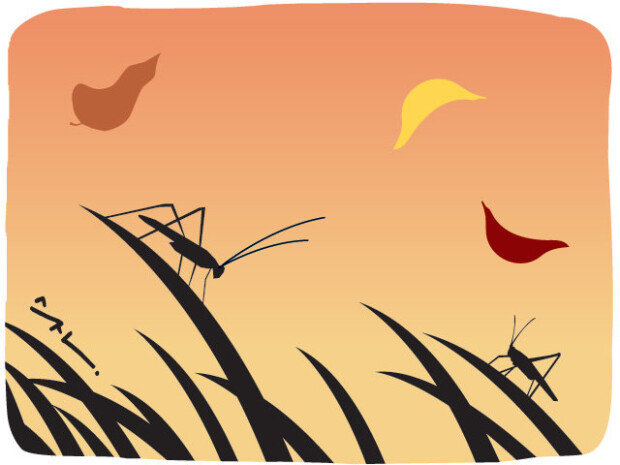Secret behind sad melody in fall season
Secret behind sad melody in fall season
Posted November. 23, 2020 07:29,
Updated November. 23, 2020 07:29


Every season of the year is characteristic of their unique sounds. Fall reminds us of the rustling sounds with fallen leaves scattering here and there and fields of reeds or silver grass making golden waves. Also, you may feel the deeply delicate emotions that chirping grass bugs such as Korean grasshoppers, locusts and crickets arouse. As fall deepens over time, they sing with an ever-increasing depth of sorrow and sadness. They even sound pitiful and pathetic late fall. How do they make such sad sounds? As people often say, they may be saddened over fall only passing by.
Although insects sound sad and poor to our ears, it is not because they feel sadness. Well, males cannot feel sad when they try to find a partner by making a mating call to lure females. You may wonder how they make such sounds without vocal folds but the fact is that other organs than the mouth can do the job of playing a good song. Locusts rub front wings with hind legs. Korean grasshoppers and crickets chirp by using the friction of front wings. The rough underside of crickets’ wings works like a violin when they get them rubbed together. Indeed, how they chirp is more like playing an instrument than like vocal music.
Just because male bugs can make some sound, doesn't necessarily mean that they are good enough. They should put everything into making their music sound better than their competitors so that females can be attracted to them thinking of their sound as gorgeous. However, nothing is easy. Doing your best does not automatically translate into rewards that you may deserve. Ironically, the harder you work, the riskier you get. Opportunities always come with risks. In other words, even predators keep their ears open to the chirping music sound. Although inevitably inviting trouble, male insects have no choice but to keep singing to successfully pass on genes to their offspring. Thus, the best thing that they can do is risk facing a life or death situation.
Then, how can we explain that the sadness in their sound gets deeper as fall does? Is it because they fail to mate? It is only natural that the loneliness in their voice deepens. Insects cannot regulate their own body temperature, which is strongly influenced by environmental changes. They make loud and beautiful sounds on a hot day because it is easy for them to warm up their body. By contrasts, cold spells make their body too numb and slow to make sounds. As the clocking is ticking, lonely males still finding a mate should do their utmost to make some sounds with a cold and hard body. Such a pathetic bodily movement sounds roughly sad to our ears.
The chirps of insects in northern regions get deeper and sadder earlier than those in southern parts. Likewise, insects make better sounds in places that get more sun than in the shadow. That is why native Indians in North America would call the chirps of crickets the poor man’s thermometer.
With it getting colder outside around this time of the year, the sad chirps become weaker and dimmer, implying that we are nearing an end of the year. The time we are enjoying is just one year out of the many years we live but it can be a whole lifetime of grass bugs. In this light, it may make some sense why they weep with sadness.







